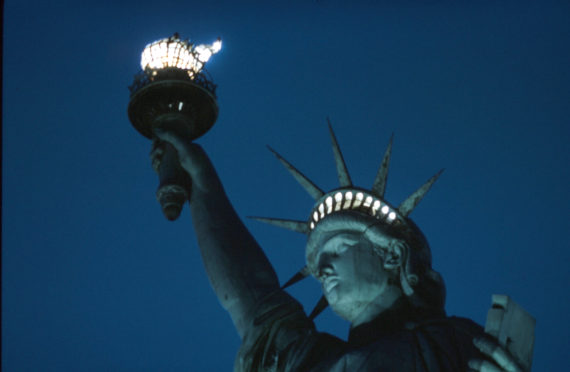The original copper of the Statue of Liberty is famously green now, tarnished with the vagaries of time, but the lamp of Libertas, of welcome, still supposedly gleaming and lifted to the world.
The pedestal of the gargantuan gift from France to America is inscribed with a sonnet by the 19th century poet Emma Lazarus, the words an uplifting song of acceptance in a world of otherwise rigid divisions.
“Here at our sea-washed, sunset gates shall stand
A mighty woman with a torch, whose flame
Is the imprisoned lightning, and her name
Mother of Exiles. From her beacon-hand
Glows world-wide welcome.”
Hard not to read those words over 100 years later and feel the stab of disappointment at modern America, the unmet ideals, the aspirations that atrophied over time. The mass shootings in El Paso, Texas, were an ugly manifestation of anti-immigration rhetoric and Liberty’s light shivers precariously in that darkness. The 21-year-old white suspect posted a message just before the attack which read, “This attack is a response to the Hispanic invasion of Texas”.
Send them back. Send them back. Those who watched Trump’s mass rally, during which the crowd repeatedly chanted the carelessly manufactured slogan about four black Democratic Congresswomen, could not but feel uneasy at the volatility of the American melting pot. Trump is accused of allowing hatred to become mainstream, for sanitising a toxic racism which takes root and flourishes, from the cosmopolitan cities to the desert of America’s deep south.
It would be too easy to simply blame Trump for the violence. But it is also too easy to suggest that there is no connection between the use – and abuse – of presidential power and the tone that is set in the society over which he presides. The man who claims every victory as his personal doing, who emphasises his impact and influence, cannot now claim to have none. Politics does not exist in a vacuum. It is not the outer rim of the societal wheel but the inner hub from which all the spokes emerge.
Political decisions drive social policy and social policy affects societal behaviour. Trump has claimed mass shootings are purely the work of misfits and are a matter of mental health, not gun control. (Decide, if you will, whether the gun lobby’s $21 million donation to his presidential campaign affects that particular assessment.) Yet he has chosen to attack Obamacare and mental health services. He blocked a move to prevent those with mental health issues owning guns because it was a matter of “freedom”. Perhaps America needs to redefine liberty. The philosopher, John Stuart Mill, declared that the only freedom worth having was that of pursuing your own good in your own way – as long as it did not impede others doing the same.
We have seen on other issues – drink driving, gender and transgender equality among them – how political movements can affect social attitudes. Just last month, a US report claimed Trump’s anti-immigration rhetoric was affecting the mental health of Latin American teenagers. In an address to the nation, Trump spoke of walls and barriers, of a network of criminal illegal immigrants who robbed and raped and murdered. “We are out of space to hold them,” he declared, like he was describing an unwelcome sea of rodents, that he, the Presidential Pied Piper, would rid America of.
The late president Ronald Reagan once seemed horrifyingly conservative but compared to Trump becomes almost progressive. In 1989, he gave a final presidential speech, a speech worth watching in light of everything that has happened since. There was a poignant melancholy about his words, a laying bare of his pride at being president and an emotional account of why he regarded America as the greatest nation on earth.
It was, he said, unique amongst nations because anyone could be American. It was full of “bold men and women yearning for freedom and opportunity” who left their homelands to start afresh. “We draw our people and our strength from every country and every corner of the world……and by doing so we continually renew and enrich our nation. If we ever close the door to new Americans, our leadership in the world would soon be lost.”
Sad that in recent weeks, a recording of Reagan making a racist comment about Africans in the 1970’s has been unearthed. His daughter says she is devastated, that his words are not only disgusting but completely unrepresentative of the man she knew and loved.
There is aspiration and then there is the human frailty that prevents us achieving it.
America’s frailty is preventing it reaching the ideals that the Mother of Exiles so proudly declares to those who pass her outstretched arm. On gun law. On freedom. On social welfare. On immigration.
Lazarus’s sonnet concludes:
“Give me your tired, your poor,
Your huddled masses yearning to breathe free,
The wretched refuse of your teeming shore.
Send these, the homeless, tempest-tost to me, I lift my lamp beside the golden door!”
Unless, obviously, you’re Mexican, Hispanic, African, Islamic….
Catherine Deveney is an award-winning investigative journalist, novelist and television presenter











